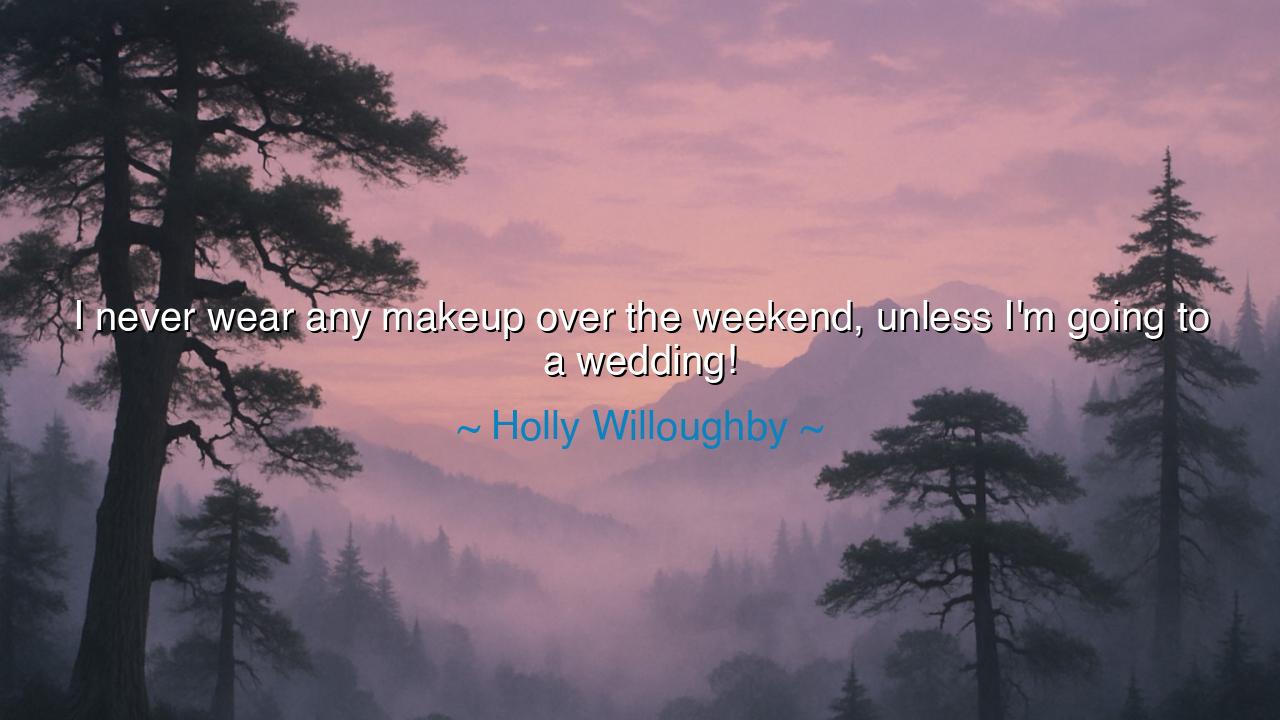
I never wear any makeup over the weekend, unless I'm going to a






Hearken, O children of balance and self-expression, to the words of Holly Willoughby, who speaks with the light-hearted wisdom of one attuned to the rhythms of rest, presentation, and ceremony. She declares that she never wears makeup over the weekend, unless she is attending a wedding. In this simple observation lies the eternal teaching: that ritual, celebration, and special occasions invite us to step beyond the ordinary, to adorn ourselves in ways that honor both self and ceremony.
The restraint in her daily practice teaches the ancient principle of moderation and preparation. Across time, sages have emphasized that beauty and adornment should be purposeful, reserved for moments when they serve significance and social ritual. Just as Roman matrons would apply cosmetics for festivals and sacred observances, but leave their faces bare for private moments, so too does Willoughby embody the wisdom of distinguishing between the sacred and the ordinary.
Consider the story of Marie Antoinette, who famously transformed herself for courtly ceremonies and balls, yet understood that the extravagance of preparation was reserved for ritualized display. Such adornment was not vanity alone, but a recognition that certain moments demand presence, attention, and honoring of tradition and social engagement. Willoughby’s choice reflects this same discernment: celebration elevates preparation into ritual.
In this preference, there is also the lesson of self-care and authenticity. By choosing to forego makeup during her leisure, she preserves her natural self while reserving her efforts for moments of shared significance. The ancients taught that wisdom lies in knowing when to act and when to rest, when to display and when to conserve one’s energies. Preparation for ceremony becomes an act of respect both for oneself and for the social fabric of celebration.
O seekers of understanding, note this truth: adornment is most meaningful when it is chosen with purpose and aligned with the significance of the occasion. Weddings, as sacred rites of passage, invite attention, presence, and ceremonial elegance. Willoughby’s words teach that restraint in ordinary life magnifies the impact of preparation for special moments, creating a rhythm of intention and reverence.
Thus, O children, carry this counsel within your hearts: honor the ordinary by simplicity, and honor the extraordinary by deliberate care. For it is in the mindful balance of rest and adornment, leisure and ceremony that the soul both flourishes and shines, celebrating life with elegance, authenticity, and joy.






QTdu quoc trung
Holly Willoughby’s approach to makeup shows that sometimes, simplicity can feel like a refreshing break. It’s interesting how she reserves makeup for weddings, which are all about celebrating beauty and joy. Do you think weddings are still perceived as events where appearances are more important, or is there a shift towards focusing more on the celebration itself than on the way we look?
TTuan
I really admire Holly Willoughby’s approach to makeup—choosing to embrace her natural look on weekends. It makes me think, is the pressure to wear makeup only on certain occasions, like weddings, part of a larger societal expectation? Should there be more encouragement for people to embrace their natural selves every day, or is it okay to reserve glamour for special events like weddings? What’s your take on the balance between natural beauty and makeup?
VBHa van bi
Holly Willoughby’s perspective on makeup is a reminder of how personal choices around beauty can differ depending on the context. Do you think the way we present ourselves in daily life versus special events reflects broader cultural trends, like how weddings are still seen as milestones that require an extra effort? What does this say about our relationship with makeup and beauty in different contexts?
ANthu anh ng
I love how Holly Willoughby embraces the concept of taking a break from makeup on weekends. It’s interesting how weddings seem to be the exception, where people go all out with their look. Does this mean we place a special emphasis on appearances for big events like weddings? Do you think this creates unrealistic expectations, or is it just part of celebrating a special occasion with some extra glamour?
RHDang Rri Hieu
Holly Willoughby’s comment about only wearing makeup for weddings is relatable. It’s refreshing to hear that even someone in the public eye embraces natural beauty during her downtime. Do you think we should all feel less pressured to wear makeup on a daily basis? Does this shift in beauty standards signify a change in how we view natural versus made-up beauty, especially on weekends or during off-hours?